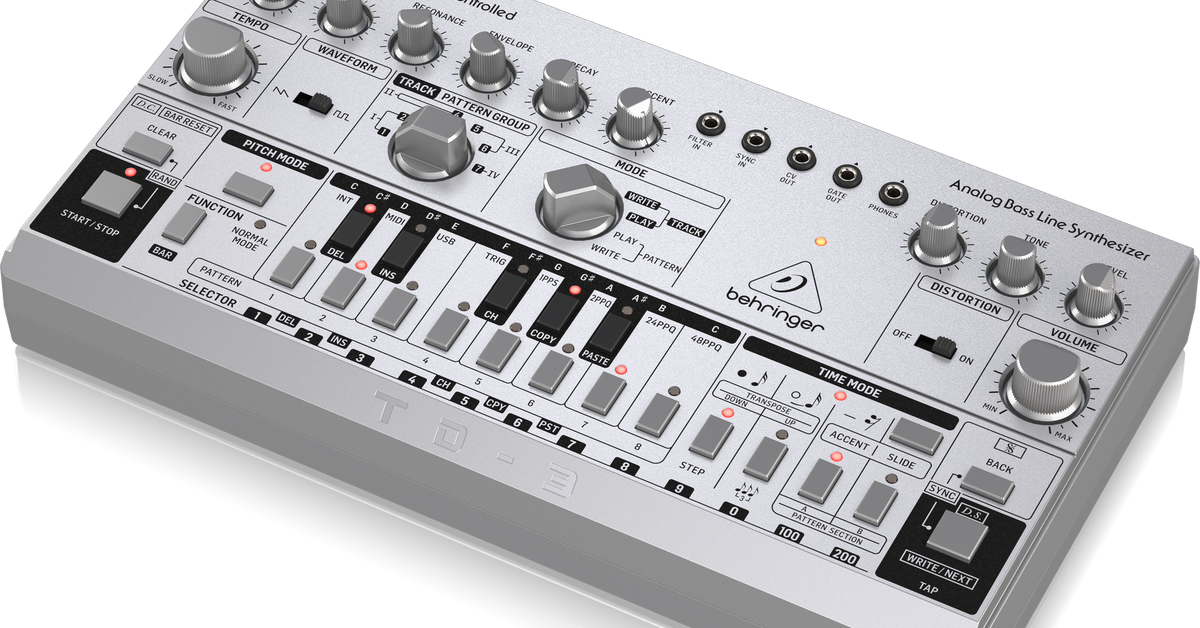
Behringer has announced its newest synth, the TD-3, an analog bass line synthesizer that’s essentially a clone of Roland’s TB-303 from 1982. Although the company doesn’t directly mention the TB-303, it gives a heavy wink by saying the TD-3 features “authentic reproduction of original circuitry with matched transistors” and a “pure analog signal path based on lcegendary VCO, VCF and VCA designs.”
The all-analog instrument gives you a sawtooth and square waveform VCO, an arpeggiator, a 4-pole low-pass resonant filter, distortion circuity, and a 16-step sequencer with 7 tracks, each with 250 user patterns. There’s also the addition of a 16-voice poly chain, which lets you combine multiple synthesizers for up to 16 voice polyphony. So, it’s not an exact replica of Roland’s TB-303, but it’s pretty darn close.
A video comparison has already popped up for those who want to see how the TD-3 stacks up to the TB-303. The side-by-side breaks down all the similarities and differences. For example, the TD-3 has a plastic body like original Roland model, and the bottom portion has the same button layout (although the TB-303 has some additional functions).
On the top half, there is an added distortion unit on the TD-3, modeled after the Boss DS-1 distortion pedal. This inclusion makes sense as a lot of artists intentionally introduced overdrive and distortion into the 303, which helped define the classic acid sound that can be heard in songs like Josh Wink’s 1995 hit “Higher State of Consciousness.”
While you can program patterns on the TD-3 itself, there’s also the ability to connect the unit via USB to your computer to create or edit patterns with Behringer’s Synth Tool app, and then import them back in.
On the whole, it appears to be a good budget version of the TB-303, but some purists might not find it up to snuff to the original. There are a lot of sonic similarities to the TB-303, but the comparison in Loopop’s video shows that certain parameters on the TD-3 sound markedly different, and it’s often brighter, sharper, and more chirpy than Roland’s original.
The original TB-303 was released back in 1982 by Roland, marketed as a “bass line” synthesizer. It was a commercial flop, but wound up being picked up by electronic musicians and became a foundational instrument for various forms of new genres in the ‘80s and ‘90s, perhaps most notably acid house. It was used by everyone from Daft Punk to Aphex Twin, and has since become an iconic mono synth, known for its characteristic resonant and squelchy sound.
While many love that Behringer’s clones make iconic hardware more affordable (buying an original TB-303 can cost thousands), the practice means the company has faced a contentious history. Behringer has been sued many times in the past by companies like Aphex Systems and Peavey Electronics Corp. for trademark infringement. And, it already faced one lawsuit from Roland back in 2005 over various issues of infringement with a line of guitar pedals. The two companies came to a confidential settlement in 2006 after Behringer changed its designs.
In some cases, Behringer has waited for patents to expire in order to replicate technologies, as it did with the Behringer D, a copy of the Minimoog Model D. Other times, it says it reverse engineers to create products. In a Facebook post last year, founder Uli Behringer defended the company’s practices by saying that “One needs to be clear about the distinction between blatantly copying someone else’s product and the principle of reverse engineering. Copying a product 1:1 is clearly illegal, however reverse engineering is something that takes place every day and is accepted as part of a product development process known as benchmarking… Think iPhone followed by Samsung Galaxy. This is the principle of competition.”
This also isn’t the first time the TB-303 has been cloned. There’s the Cyclone Analogic Bass Bot TT-303 MK2, the DinSync RE-303, and others. On its end, Roland filed for a European Union trade mark earlier this year for the TB-303, which includes an image of the hardware’s visual layout and design. For now, the status of that filing is still pending.
Behringer’s TD-3 is available for pre-order in silver, red, and blue, and costs $150.
https://www.theverge.com/2019/11/8/20955772/behringer-td-3-synthesizer-announced-features-roland-tb-303

